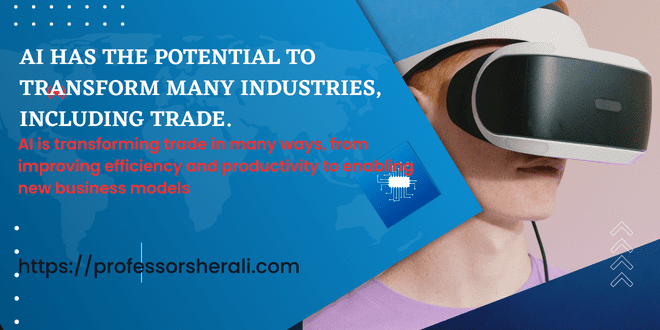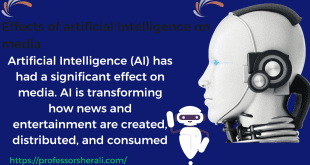0
Artificial Intelligence (AI) has become a buzzword in the world of technology and business, and for good reason. AI has the potential to transform many industries, including trade. In this article, we’ll explore the impacts of AI on trade. what does AI means for businesses and consumers around the world.
Increased Efficiency and Productivity
First,One of the most significant impacts of AI on trade is increased efficiency and productivity. AI-powered systems can automate many of the manual and repetitive tasks. These tasks involved in trade, such as data entry, processing invoices, and tracking shipments. This automation can free up human workers to focus on more strategic and creative tasks. It improve productivity and reducing costs.
Improved Supply Chain Management
Secondly,AI can also improve supply chain management in trade. AI-powered systems can analyze data from various sources, including weather forecasts, traffic patterns, and supplier performance. It optimize logistics and reduce delays. This can help businesses to better manage inventory, reduce waste. It also ensure timely delivery of goods.
Enhanced Customer Experience
Thirdly,AI can also enhance the customer experience in trade. AI-powered chatbots can provide instant customer support and answer common questions, reducing the need for human customer service agents. AI can also personalize the shopping experience by analyzing customer data. It can provide personalized recommendations and promotions.
Increased Competition and Disruption
Next,While AI can bring many benefits to trade, it can also increase competition and disruption. AI-powered systems can enable new market entrants to compete with established players. It leads to increase in competition and pressure to innovate. This can be beneficial for consumers, who may benefit from lower prices and improved products and services. But, it can also be challenging for businesses that are slow to adapt.
Ethical and Regulatory Challenges
Moreover, AI can raise ethical and regulatory challenges in trade. AI-powered systems can make decisions based on complex algorithms that are difficult to understand or audit. This can raise concerns about bias, discrimination, and accountability. One more thing is the use of AI in trade may require new regulations and policies to ensure fair competition and protect consumers.

Predictive Analytics and Forecasting
Further more,AI can also be used to make more accurate predictions and forecasts in trade. By analyzing historical data and identifying patterns. AI can help businesses make more informed decisions about inventory management, pricing, and supply chain optimization. In addition to this, it can help businesses to reduce waste, optimize resources, and increase profitability.
Improved Quality Control
What’s more, AI-powered systems can also improve quality control in trade. By analyzing data from sensors and other sources, AI can identify quality issues in products and alert businesses to potential defects or problems. moreover, this can help businesses to identify and address quality issues early on, reducing waste and improving customer satisfaction.
Increased Transparency
beside this, AI can also increase transparency in trade. By providing real-time data on the movement of goods and the status of orders, AI can help businesses and consumers to better track and monitor trade activities. Next, This can help to reduce fraud and improve supply chain security.
New Business Models
And then, AI can also enable new business models in trade. For example, AI-powered systems can enable businesses to offer personalized products and services to customers. It is based on their individual preferences and behaviors. This can help businesses to differentiate themselves from competitors and build stronger customer relationships.
Skills and Training
Finally, AI is also impacting the skills and training needed in trade. As AI-powered systems become more prevalent. Businesses will need to train employees to work alongside these systems and use them effectively. This will require new skills and training programs to ensure that employees can adapt to these changes and remain competitive in the job market.
In conclusion, AI is transforming trade in many ways, from improving efficiency and productivity to enabling new business models and changing the skills and training needed in the industry. While AI brings many benefits, it also poses challenges, including increased competition and disruption, as well as ethical and regulatory concerns. As AI continues to evolve, it will be important for businesses to stay ahead of the curve and leverage these technologies effectively to remain competitive in the global marketplace.
 Professor Sher Ali My site
Professor Sher Ali My site



Good enough